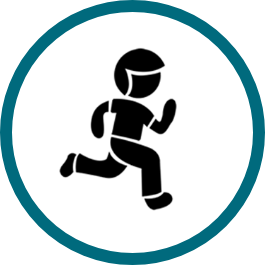Timely and appropriate treatment for diarrhea can prevent 93% of deaths due to diarrhea among children. 1The effect of oral rehydration solution and recommended home fluids on diarrhea mortality
Munos M, Fischer-Walker C.L., Black R.E.
2010 This is an occasional behavior that needs to be practiced without hesitation at the onset of diarrhea.

Management of Diarrhea
Behavior: Caregivers appropriately manage diarrhea in children
Key Points from Global Research
- Expanding the number of well-trained, stocked and sanctioned private-sector providers selling diarrhea treatments can encourage caregivers to properly treat diarrhea.
- Packaging or selling oral rehydration salts (ORS) and zinc together can ensure caregivers obtain what they need and provide the proper, continual treatment for diarrhea.
- Assuring fixed, proper pricing of both ORS and zinc can encourage caregivers to use it properly and when needed.
Behavior Profile Sample: Management of Diarrhea
A Behavior Profile is a summary analysis of each behavior. This sample draws from global evidence and illustrates the result of using the Create Behavior Profiles Tool to analyze factors, supporting actors and strategies and to ensure logical pathways exist between strategies proposed and factors related to the practice of the behavior. This sample may be used as a starting point or reference for creating Behavior Profiles.
| Improve maternal and child survival | |
|
Behavior: Caregivers appropriately manage diarrhea in children Indicator: Percentage of children born in the five years preceding the survey with diarrhea in the two weeks preceding the survey who received oral rehydration solution (ORS), that is either fluid from an ORS packet or a pre-packaged ORS fluid
|
Behavior Analysis |
Strategy | ||
|---|---|---|---|
STEPSWhat steps are needed to practice this behavior?
Click on any box |
FACTORSWhat factors may prevent or support practice of this behavior? These should be analyzed for each country context.StructuralAccessibility: ORS and zinc are either out of stock or not always readily available beyond the health system Accessibility: Zinc is expensive, even when co-packaged with ORS Service Provider Competencies: Providers tend to over-prescribe antibiotics and not emphasize the importance of ORS with zinc Service Experience: Caregivers do not go to sanctioned providers because they prefer informal sector sources that are nearby for treatment of diarrhea SocialNorms: Caregivers do not seek immediate care for diarrhea because it is considered common and expected for young children InternalAttitudes and Beliefs: Caregivers do not use ORS and zinc because they are skeptical about their effectiveness and prefer antibiotics Attitudes and Beliefs: Caregivers will not complete the full course of zinc believing that once the diarrhea has stopped it is not necessary Knowledge: Some caregivers are unaware of the benefits of ORS and many do not know about the use of zinc, and the need for special recuperative feeding after illness Skills: Most caregivers do not follow the full 10-14 day zinc regime because they do not understand the instructions |
SUPPORTING ACTORS AND ACTIONSWho must support the practice of this behavior?InstitutionalPolicymakers: Seek policies to promote equitable access to ORS and zinc Policymakers: Begin dialogue to ensure private sector is engaged and sanctioned Providers: Prescribe ORS/Zinc instead of antibiotics for diarrhea and explain benefit to caregivers Logistics Personnel: Actively monitor stock levels and forecast needed medical supplies and drugs CommunityCommunity Health Workers and Peer Educators: Follow-up with families whose children have diarrhea to ensure that ORS is properly mixed and that a full course of zinc is taken Community and Religious Leaders: Promote immediate care-seeking for all sick children and importance of ORS and zinc |
POSSIBLE PROGRAM STRATEGIESHow might we focus our efforts based on this analysis?Enabling EnvironmentFinancing: Expand free or low-cost access to ORS and zinc Partnerships and Networks: Engage the private sector in recommending and distribution of ORS and zinc at local pharmacies Systems, Products and ServicesProducts and Technology: Combine ORS and zinc packets in grocery stores, pharmacies, kiosks, etc Supply Chain: Set up effective supply chain and quality control systems for public and private sectors Quality Improvement: Ensure health care personnel (public and private) practice appropriate antibiotic prescription vs use of ORS and zinc and train them on how to communicate that to caregivers Demand and UseCommunication: Provide pictorial instructions for mixing and administering ORS and daily reminders for zinc supplements Collective Engagement: Conduct ongoing community activities about the dangers of dehydration resulting from diarrhea, the need for immediate careseeking, effectiveness of ORS and zinc, and the need for recuperative feeding after illness |
Global Status of Accelerator Behavior
Indicator: Percentage of children born in the five years preceding the survey with diarrhea in the two weeks preceding the survey who received oral rehydration solution (ORS), that is either fluid from an ORS packet or a pre-packaged ORS fluid
The DHS Program Indicator Data API, The Demographic and Health Surveys (DHS) Program


 The Manoff Group was acquired by JSI in 2022.
The Manoff Group was acquired by JSI in 2022.